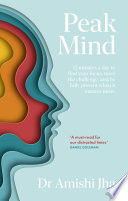

Peak Mind delves into the science behind mindfulness, explaining how it can enhance mental clarity and emotional regulation. Mindfulness, a practice rooted in ancient traditions, has been supported by modern research as a method to improve focus and reduce stress. The book outlines various techniques to cultivate mindfulness, such as meditation, breathing exercises, and mindful observation. These practices not only help in centering oneself but also in enhancing cognitive flexibility, which is crucial in navigating complex challenges in both personal and professional realms. The authors emphasize that by integrating mindfulness into daily routines, individuals can experience a profound shift in their mental well-being and overall performance.
Continue readingCognitive flexibility refers to the ability to adapt one's thinking and behavior in response to changing circumstances. Peak Mind highlights its importance as a skill that can be developed through practice and awareness. The book describes various exercises designed to enhance cognitive flexibility, such as perspective-taking and scenario planning. By fostering this adaptability, individuals can better manage stress, solve problems creatively, and respond effectively to unexpected challenges. The authors argue that cultivating cognitive flexibility is essential for leaders and innovators, as it allows them to pivot and adjust strategies in a rapidly changing environment.
Continue readingEmotional intelligence (EI) is a cornerstone of effective leadership and interpersonal relationships. Peak Mind discusses how EI encompasses self-awareness, self-regulation, motivation, empathy, and social skills. The book provides insights into developing these competencies through reflective practices and feedback mechanisms. By enhancing emotional intelligence, individuals can improve their communication, build stronger relationships, and foster a positive workplace culture. The authors illustrate that leaders with high EI are better equipped to inspire their teams, navigate conflicts, and create an environment of trust and collaboration.
Continue readingResilience is the capacity to recover from difficulties and adapt to challenging situations. Peak Mind emphasizes that resilience can be cultivated through specific strategies such as reframing negative thoughts, building a support network, and maintaining a healthy lifestyle. The book shares stories of individuals who have overcome significant challenges, illustrating the power of resilience in achieving personal and professional goals. The authors argue that resilience not only enhances individual well-being but also contributes to organizational success, as resilient teams are more likely to thrive in adversity and maintain high performance.
Continue readingFinding purpose and meaning in one's work is a key theme in Peak Mind. The authors discuss how a strong sense of purpose can drive motivation, engagement, and satisfaction. They encourage readers to reflect on their values and passions to identify what truly matters to them. The book provides exercises for aligning daily activities with one's purpose, fostering a sense of fulfillment and direction. The authors contend that individuals who are clear about their purpose are more resilient, better able to handle stress, and more likely to achieve their goals.
Continue readingA growth mindset, as opposed to a fixed mindset, is the belief that abilities and intelligence can be developed through effort and learning. Peak Mind underscores the significance of adopting a growth mindset in both personal and professional contexts. The book outlines strategies for fostering this mindset, such as embracing challenges, learning from criticism, and celebrating effort over outcome. By cultivating a growth mindset, individuals can enhance their learning, resilience, and overall performance. The authors argue that organizations that promote a growth mindset culture are more innovative and adaptable.
Continue readingPeak Mind highlights the importance of community and social connections in enhancing mental well-being and performance. The authors discuss how strong relationships provide support, encouragement, and a sense of belonging. They advocate for intentional efforts to build and nurture connections, both personally and professionally. The book presents research showing that social support can buffer against stress and contribute to overall happiness. The authors encourage readers to engage with their communities, seek mentorship, and foster collaborative environments, recognizing that collective strength can lead to greater success.
Continue readingThe reading time for Peak Mind depends on the reader's pace. However, this concise book summary covers the 7 key ideas from Peak Mind, allowing you to quickly understand the main concepts, insights, and practical applications in around 23 min.
Peak Mind is definitely worth reading. The book covers essential topics including The Science of Mindfulness, Cognitive Flexibility, The Role of Emotional Intelligence, providing practical insights and actionable advice. Whether you read the full book or our concise summary, Peak Mind delivers valuable knowledge that can help you improve your understanding and apply these concepts in your personal or professional life.
Peak Mind was written by Amishi Jha.
If you enjoyed Peak Mind by Amishi Jha and want to explore similar topics or deepen your understanding, we highly recommend these related book summaries:
These books cover related themes, complementary concepts, and will help you build upon the knowledge gained from Peak Mind. Each of these summaries provides concise insights that can further enhance your understanding and practical application of the ideas presented in Peak Mind.